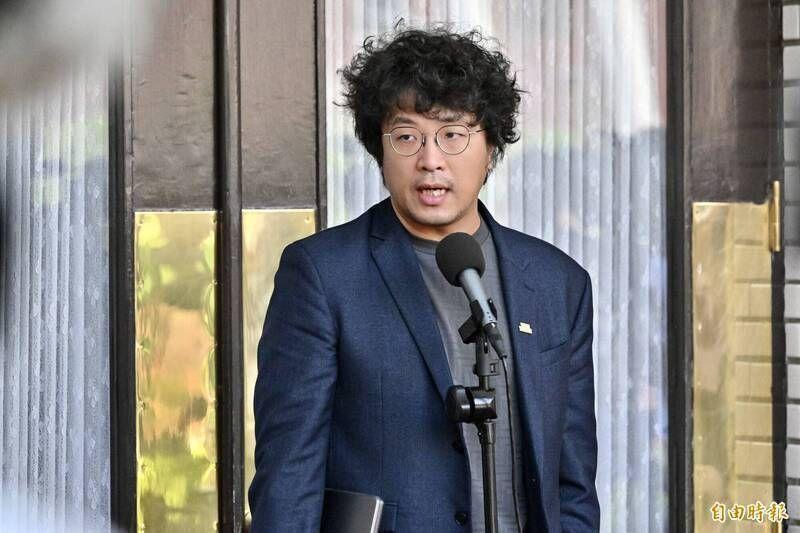A company owned by the father of Democratic Progressive Party Legislator Puma Shen (沈伯洋) has been sanctioned by China, the Xinhua news agency reported.
Companies linked to “Taiwan independence” separatists would not be allowed “to profit from the mainland,” Xinhua cited China's Taiwan Affairs Office spokeswoman Zhu Fenglian (朱鳳蓮) as saying.
Shen’s father, Shen Tu-cheng (沈土城), serves as head of Sicuens International Co (兆億有限公司).

Photo: George Tsorng, Taipei Times
The company is prohibited from performing transactions or cooperating with any organizations, enterprises or individuals in China, Zhu was quoted as saying.
Other measures would be taken if necessary, she said.
Puma Shen said in a video he posted online that he was “honored” to be sanctioned by the Taiwan Affairs Office for the third time in one year, adding that the sanctions harm the interests of China’s citizens.
China is punishing him and his family for his support of national security-related amendments and laws, including that lawmakers should be required to report visits to China and be punished for engaging in “united front” work, he said.
“For China, even breathing is considered Taiwanese independence,” he said, adding that punishing his family for his own political views was “collective punishment.”
In October last year, the office named Puma Shen in a list of “Taiwanese independence activists,” banning him from traveling to China, including Hong Kong and Macau, and restricted cooperation with his organizations, such as the Kuma Academy.
Hong Kong-based Wen Wei Po and Ta Kung Pao on Tuesday reported that Shen Tu-cheng had made hundreds of millions of yuan in business dealings, had an affair with a Chinese woman and made his money by reselling Chinese goods.
Ta Kung Pao reported that the Kuma Academy made money by selling “war anxiety” to Taiwanese.
Puma Shen said that the newspaper reports were slanderous and fabrications.
Wang Chih-sheng (王智盛), an associate professor in Central Police University’s Border Police Department, said the reporting and actions by Chinese authorities show that the actions were arranged.
The authorities are punishing Puma Shen and his family due to anxieties about the recall movement targeting Chinese Nationalist Party (KMT) lawmakers, Wang said.
Additional reporting by Li Wen-Hsin

The Coast Guard Administration (CGA) yesterday said it had deployed patrol vessels to expel a China Coast Guard ship and a Chinese fishing boat near Pratas Island (Dongsha Island, 東沙群島) in the South China Sea. The China Coast Guard vessel was 28 nautical miles (52km) northeast of Pratas at 6:15am on Thursday, approaching the island’s restricted waters, which extend 24 nautical miles from its shoreline, the CGA’s Dongsha-Nansha Branch said in a statement. The Tainan, a 2,000-tonne cutter, was deployed by the CGA to shadow the Chinese ship, which left the area at 2:39pm on Friday, the statement said. At 6:31pm on Friday,

The Chinese People’s Liberation Army Navy’s (PLAN) third aircraft carrier, the Fujian, would pose a steep challenge to Taiwan’s ability to defend itself against a full-scale invasion, a defense expert said yesterday. Institute of National Defense and Security Research analyst Chieh Chung (揭仲) made the comment hours after the PLAN confirmed the carrier recently passed through the Taiwan Strait to conduct “scientific research tests and training missions” in the South China Sea. China has two carriers in operation — the Liaoning and the Shandong — with the Fujian undergoing sea trials. Although the PLAN needs time to train the Fujian’s air wing and

The American Institute in Taiwan (AIT) put Taiwan in danger, Ma Ying-jeou Foundation director Hsiao Hsu-tsen (蕭旭岑) said yesterday, hours after the de facto US embassy said that Beijing had misinterpreted World War II-era documents to isolate Taiwan. The AIT’s comments harmed the Republic of China’s (ROC) national interests and contradicted a part of the “six assurances” stipulating that the US would not change its official position on Taiwan’s sovereignty, Hsiao said. The “six assurances,” which were given by then-US president Ronald Reagan to Taiwan in 1982, say that Washington would not set a date for ending arm sales to Taiwan, consult

A Taiwanese academic yesterday said that Chinese Ambassador to Denmark Wang Xuefeng (王雪峰) disrespected Denmark and Japan when he earlier this year allegedly asked Japan’s embassy to make Taiwan’s representatives leave an event in Copenhagen. The Danish-language Berlingske on Sunday reported the incident in an article with the headline “The emperor’s birthday ended in drama in Copenhagen: More conflict may be on the way between Denmark and China.” It said that on Feb. 26, the Japanese embassy in Denmark held an event for Japanese Emperor Naruhito’s birthday, with about 200 guests in attendance, including representatives from Taiwan. After addressing the Japanese hosts, Wang